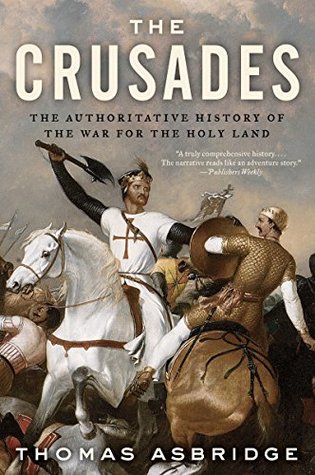More on this book
Community
Kindle Notes & Highlights
Read between
February 25 - March 15, 2019
the word ‘crusade’–already disassociated from religion–was starting to be detached in the English language from its medieval roots. In 1915 the British Prime Minister David Lloyd George described the First World War as ‘a great crusade’ in a rallying speech. By the time of the Second World War, General Dwight D. Eisenhower’s D-Day orders, issued for 6 June 1944, contained the exhortation to Allied troops: ‘You are about to embark on a great crusade.’ Eisenhower’s 1948 account of the war was entitled Crusade in Europe.12
Around 1865, the translation of French histories by Arabic-speaking Syrian Christians led to the first uses of the term al-hurub al-Salabiyya (the ‘Cross’ wars) for what before had been known as the wars of the Ifranj (the Franks). In 1872, an Ottoman Turk, Namik Kemal, published the first ‘modern’ Muslim biography of Saladin–a work seemingly written to refute Michaud’s triumphalist history that had recently been translated into Turkish.
The critical change came, however, after the Second World War, with the UN-mandated foundation of the state of Israel in 1948–the realisation of what has been called Zionism. That October, the commentator ‘Abd al-Latif Hamza wrote that ‘the struggle against Zionists has reawakened in our hearts the memory of the crusades’. From 1948 onwards, the Muslim world engaged in an increasingly active re-examination of the medieval war for the Holy Land. Arab-Islamic culture already had a long tradition–stretching back to the central Middle Ages and beyond–of seeking to learn from the past. It is not
...more
The crusader period was, and is, exceptionally well suited to the needs of Islamic propagandists.
The precepts of Arab Nationalism are essentially secular in character: positing the separation of spiritual and temporal authority in Islam; and advocating the governance of Arab Muslim states by political, rather than religious, leaders. As such, Arab Nationalist leaders have shown little interest in the crusades as wars of religion, focusing instead upon the notion of threatening foreign imperialism and the propaganda value of forging comparisons between their own lives and the achievements of Saladin.
Islamism is the polar opposite of Arab Nationalism in terms of ideology–espousing the notion that Islam must be governed as a theocracy. Nonetheless, Islamists have, if anything, been even more strident in their attempts to establish spurious links between the medieval crusades and the modern world. Given its spiritual perspective, Islamist propaganda presents the crusades as aggressive religious wars waged against the Dar al-Islam (Islamic territory), the only response to which can be violent physical jihad. One of the most influential Islamist ideologues, Sayyid Qutb (who was executed in
...more
the dangers attendant upon ‘crusade parallelism’ have proven to be particularly intense. Over the last two centuries, a fallacious narrative has taken hold. It suggests that the crusades were pivotal to the relationship between Islam and the West because they engendered a deep-rooted and irrevocable sense of mutual antipathy, leaving these two cultures locked in a destructive and perpetual war. This notion–of a direct and unbroken trail of conflict linking the medieval and modern eras–has helped to cultivate a pervasive, and almost fatalistic, acceptance that a titanic clash of civilisations
...more
These wars lay bare the power of faith and ideology to inspire fervent mass movements and to elicit violent discord; they affirm the capacity of commercial interests to transcend the barriers of conflict; and they illustrate how readily suspicion and hatred of the ‘other’ can be harnessed. But the notion that the struggle for dominion of the Holy Land–waged by Latin Christians and Levantine Muslims so many centuries ago–does, or somehow should, have a direct bearing upon the modern world is misguided. The reality of these medieval wars must be explored and understood if the forces of
...more


